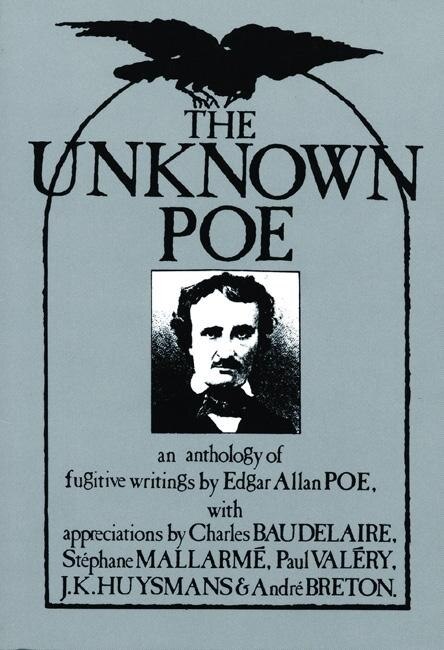Home
The Unknown Poe, Paperback | Indigo Chapters

Coles
The Unknown Poe, Paperback | Indigo Chapters
From City Lights Publishers
Current price: $24.50
Loading Inventory...
Size: 0.4 x 8 x 170
*Product information may vary - to confirm product availability, pricing, and additional information please contact Coles
An indispensable anthology of brilliant hard-to-find writings by Poe on poetry, the imagination, humor, and the sublime which adds a new dimension to his stature as a speculative thinker and philosopher. Essays (in translation) by Charles Baudelaire Stephane Mallarme, Paul Valery, & Andre Breton shed light on Poe's relevance within European literary tradition. These are the arcana of Edgar Allan Poe: writings on wit, humor, dreams, drunkenness, genius, madness, and apocalypse. Here is the mind of Poe at its most colorful, its most incisive, and its most exceptional. Edgar Allan Poe's dark, melodic poems and tales of terror and detection are known to readers everywhere, but few are familiar with his cogent literary criticism, or his speculative thinking in science, psychology or philosophy. This book is an attempt to present his lesser known, out of print, or hard to find writings in a single volume, with emphasis on the theoretical and esoteric. The second part, The Friend View,\" includes seminal essays by Poe's famous admirers in France, clarifying hisinternational literary importance. America has never seen such a personage as Edgar Allan Poe. He is a figure who appears once an epoch, before passing into myth. American critics from Henry James to T. S. Eliot have disparaged and attempted to explain away his influence to no end, save to perpetuate his fame. Even the disdainful Eliot once conceded, \"and yet one cannot be sure that one's own writing has not been influence by Poe.\"\"Edgar Allan Poe was and is a turbulence, an anomaly among the major American writers of his period, an anomaly to this day. He both amazed and antagonized his contemporaries, who could not dismiss him from the first rank of writers, though many felt his work to be morally questionable and in dubious taste, and though he scourged them in print regularly in the course of producing a body of criticism that is sometimes flatly vindictive and often brilliant.\" -Marilynne Robinson, The New York Times Review of BooksEdgar Allan Poe (1809-1849), born in Boston, Massachusetts, was an American poet, writer, editor, and literary critic. He is well known for his haunting poetry and mysterious short stories. Regarded as being a central figure of Romanticism, he is also considered the inventor of detective fiction and the growing science fiction genre. Some of his most famous works include poems such as \"The Raven,\" \"Annabel Lee,\" and \"A Dream Within a Dream\"; tales such as \"The Cask of Amontillado,\" \"The Masque of Red Death,\" and \"The Tell-Tale Heart.\" \""There has never been any doubt about Poe's enormous literary significance, but, with regard to his ultimate artistic merit, there has been considerable disagreement. To some he is little more than a successful charlatan, whose literary performances are only a virtuoso's display of stunning, but finally shallow, effects. Others, however, are struck by Poe's profound probing of the human psyche, his philosophical sophistication, and his revolutionary attitude toward literary language. No doubt both sides of this argument are in part true in their assessments. Poe's work is very uneven, sometimes reaching great literary heights, at other times striking the honest reader as meaningless, pathetic, or simply wrong-headed. This is not surprising, considering the personal turmoil that characterized so much of Poe's short life. Poe was extreme in his literary views and practices; balance and equilibrium were not literary values that he prized. Scorning the didactic element in poetry, Poe sought to separate beauty from morality. In his best poems, such as \"The City in the Sea\" (1836), he achieved an intensification of sound sufficient to threaten the common sense of the poetic line and release a buried, even a morbid, sense that would enchant the reader by the sonic pitch of the poem. Defining poetry as \"the rhythmic creation of beauty,\" Poe not only sought the dream buried beneath the poetic vision-Coleridge had already done that-but also abandoned the moral rationale that gave the buried dream symbolic meaning. The dream, or nightmare, was itself the content of the verse. Some readers, however, such as T. S. Eliot, have found Poe's poetry extremely limited, both in its content and in its technique. While it is true that Poe was one of the few American poets to achieve international fame during the nineteenth century, critics point out that his influence on such literary movements as French symbolism and literary modernism was largely through the superb translations and criticisms of his writings by Baudelaire (see Vol. 2), Mallarme (see Vol. 2), and Valery (see Vol. 2). Poe's theory of the short story, as well as his own achievements in that genre, contributed substantially to the development of the modern short | The Unknown Poe, | The Unknown Poe, Paperback | Indigo Chapters





















